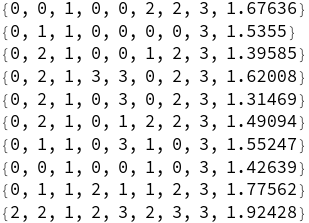Consider the following table:
grid1 = {0.1, 0.2, 0.2, 0.3, 0.4, 0.5};
grid2 = {0.2, 0.3, 0.7, 0.8, 1.1, 1.2};
grid3 = {0.17, 0.25, 0.35, 0.35, 0.4};
tuples = Join[Tuples[{grid1, grid2, grid3}],RandomReal[{1, 2}, {6*6*5, 1}],2];
I do not have grid1, grid2, grid3, only the resulting tuples, but I want to find them. If they did not contain duplicating points, it would be, e.g., simply
grid1 = DeleteDuplicates[tuples[[All,1]]]
but it would remove the extra 0.2 and make things wrong:
{0.1, 0.2, 0.3, 0.4, 0.5}
Is there any quick approach to the extraction of these grids?
Actually, I simply need to find the duplicates in each of the grids.
Edit
An ugly way would be like this:
grid1 = tuples[[All, 1]] // DeleteDuplicates
tableoccurences=Table[Length[Select[tuples, #[[1]] == grid1[[i]] &]], {i, 1, Length[grid1], 1}]
occmin = tableoccurences // Min
grid1 = Table[
Table[grid1[[i]], tableoccurences[[i]]/occmin], {i, 1,
Length[grid1], 1}] // Flatten
and so on. tableoccurences counts the number of times each element of the grid is present in tuples. The main problem is that the approach assumes that occmin corresponds to the element that is present only once.


tuples? And can you clarify what "Actually, I simply need to find the duplicates in each of the grids." means? $\endgroup$